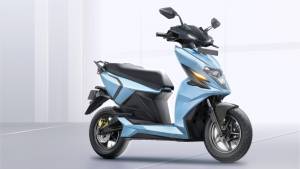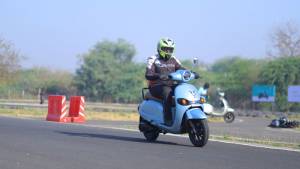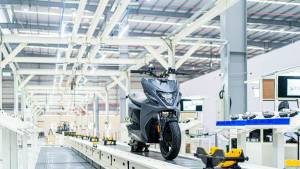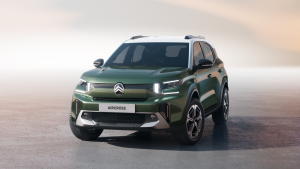Indian EV start-up Simple Energy claims 280km of riding range from its first e-scooter
In recent times, we have seen mainstream manufacturers like Bajaj Auto and TVS Motor Company enter the electric vehicle market, a market that is expected to grow to a scale of over Rs 5,000 crore by 2025 at a CAGR of around 34 per cent.
While companies like Ather Energy and Okinawa Scooters have already established themselves in the electric two-wheeler space, there is a new EV player coming in with some astounding claims.
Called Simple Energy, this Bengaluru-based company is founded by Suhas Rajkumar, a 24-year old with an architectural background, who has previously dabbled in a robotics-based startup. His EV venture, Simple Energy, boasts of a core team that has previously worked with brands like TVS, Tork Motors, Ather Energy, Ultraviolette Automotive, and even Tesla, in advisory roles in production, battery systems and electricals.
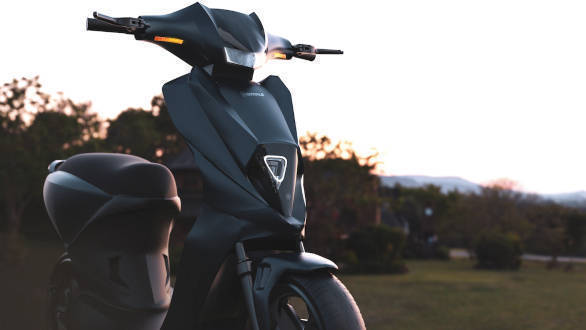 The Mark 2 concept's design of front panel crown, split tail lamps and the side panel is inspired by a bird native to central Asia, the Indian Paradise Flycatcher. The LED light on the apron takes its cues from Iron Man's arc reactor.
The Mark 2 concept's design of front panel crown, split tail lamps and the side panel is inspired by a bird native to central Asia, the Indian Paradise Flycatcher. The LED light on the apron takes its cues from Iron Man's arc reactor.
Suhas began working on the prototype of the electric scooter in 2018 with the basic idea of delivering a range of 150km, gradeability of 15 degrees and a 0-50kmph acceleration time of 5s. His company Simple Energy came into existence in January 2019 and claims to focus on three aspects range anxiety, charging time and affordability. The company's first production model being developed is internally designated the Mark 2. It has already completed the necessary testing, clocking over 35,000km and will be launched in March 2021.
Mark 2
What makes the Mark 2 different to the likes of the Bajaj Chetak, TVS iQube and Ather 450X? The Simple Energy Mark 2's edge over its competitors is a substantially higher claimed riding range of close to 280km. This is a tall claim for an electric two-wheeler, especially when you consider SUVs like the Tata Nexon EV has an ARAI-approved driving range of 312km. The basic and very simple fundamentals of an EV state that to increase range you need denser, larger or more batteries. This brings with it packaging challenges.
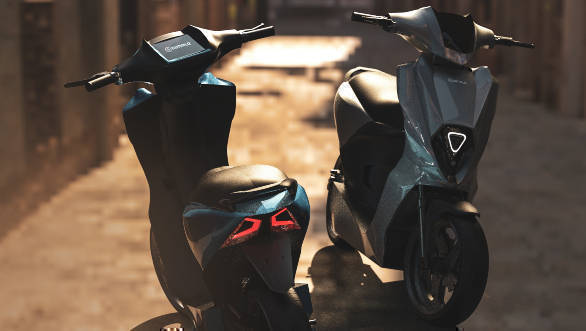 The Mark 2's higher claimed range of 260-280km was achieved under ideal conditions when ridden at speeds of 30- 35kmph with no air or surface resistance.
The Mark 2's higher claimed range of 260-280km was achieved under ideal conditions when ridden at speeds of 30- 35kmph with no air or surface resistance.
Adding batteries or making them larger is easier in a large vehicle, not on a step-thru. For reference, the Chetak's claimed maximum riding range is 95km while that of the iQube is 75km. The Ather 450X, on the other hand, promises an 85km riding range. Suhas confirms that Simple Energy's prototype, the Mark 1 had accomplished a range of 200km, with a top speed of 75kmph and a payload of 119kg.
The Mark 2's higher claimed range of 260-280km was achieved under ideal conditions when ridden at speeds of 30- 35kmph with no air or surface resistance. Real world riding conditions may narrate an entirely different tale, and those figures have yet to be established. So, where does that phenomenal range claim come from? Powering the Mark 2 is a mid-mounted IP67-rated 3.5kW (continuous) BLDC electric motor producing 72Nm. Drive is via a chain drive, similar to what's offered on the Taiwanese Gogoro scooters. Simple Energy has also developed its own battery management system, which is where most of the efficiency benefits come from. In addition the Mark 2 has a lightweight chassis, which Suhas claims will be superior to the ones offered on the current crop of conventional scooters but more economical to produce compared to, for instance, Ather's cast-aluminium frame. All of these contribute to the overall economy of the scooter.
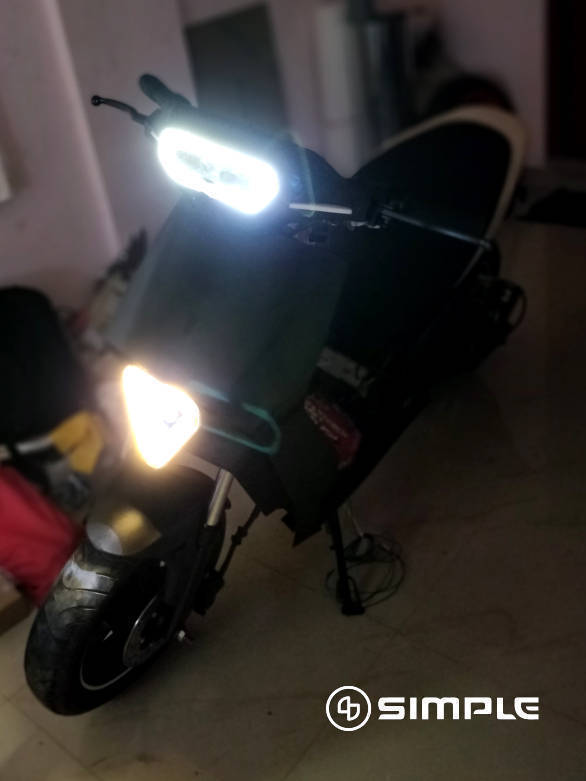 Suhas confirms that Simple Energy's prototype, the Mark 1 had accomplished a range of 200km, with a top speed of 75kmph and a payload of 119kg.
Suhas confirms that Simple Energy's prototype, the Mark 1 had accomplished a range of 200km, with a top speed of 75kmph and a payload of 119kg.
The Mark 2's three riding modes help it deliver a range of 180km in Sport, 220km in Normal mode and 260-280km in Eco mode. The Mark 2 boasts of a 0-50kmph acceleration of 3.2s. The IP67-rated 72V 4.8kWh removable Li-ion battery pack, developed by Panasonic, comes with fast and normal charging modes. While normal charging can be done in six hours, fast charging can achieve 0-80 per cent charge in 40 minutes and 100 per cent charge in 1 hour 10 minutes. Simple Energy will provide fast charger docks at an additional cost. Simple Energy also claims that the Mark 2 will be capable of reaching a top speed of 105kmph.
On the feature front, the Mark 2 will come with a 7-inch TFT touchscreen instrumentation with 4G, Bluetooth and navigation. The e-scooter will be offered with single-channel ABS as standard, with regenerative braking. 85 per cent of the Mark 2 will be localised, with the electric motor built in India. The battery cells will come from Japan and South Korea, while the battery pack has been made in-house by Simple Energy. The Mark 2 concept's design of front panel crown, split tail lamps and the side panel is inspired by a bird native to central Asia, the Indian Paradise Flycatcher. The LED light on the apron takes its cues from Iron Man's arc reactor. Simple Energy confirms 85- 90 per cent of the scooter seen in these images will make it to production.
The Mark 2 is expected to be launched in March 2021, after getting ARAI certification.
Investment
Simple Energy has as many as seven international patents filed for the battery (battery management system included) and other mechanical and charging components. In terms of investment, Simple Energy has bootstrapped Rs 1.5 crore, with a couple of angel investors adding to the kitty. Initial funding was used in the development of the Mark 1 prototype. Suhas also confirmed that the company will soon be raising $1 million that will be used in the development, testing and certification of the Mark 2 scooter.
 "The pain points are range, performance, charging infra/charging time and cost. We will solve these by offering a longer range, high performance, fast charging and removable battery for ease of charging at home even if you don't have a parking space, at the same time making it affordable" - Suhas Rajkumar, Founder, Simple Energy
"The pain points are range, performance, charging infra/charging time and cost. We will solve these by offering a longer range, high performance, fast charging and removable battery for ease of charging at home even if you don't have a parking space, at the same time making it affordable" - Suhas Rajkumar, Founder, Simple Energy
Further, Simple Energy is planning to get a $10 million funding from a Singapore-based investment firm in December this year. Simple Energy has identified a site at Yelahanka in Bangalore, where it plans to manufacture its electric vehicles. Simple Energy claims that the production of the Mark 2 will commence from June 2021 with deliveries starting in September 2021. By December 2021, Simple Energy aims at reaching a capacity of 50,000 units from this plant.
Pricing
This EV startup will be setting its fast-charging station called Simple Matrix in all major cities but believes that the Mark 2 with its long-range and removable battery pack will not be heavily dependent on it. Simple Energy, in its initial phase, will target Bangalore and Mumbai and will then expand to the other parts of the country.
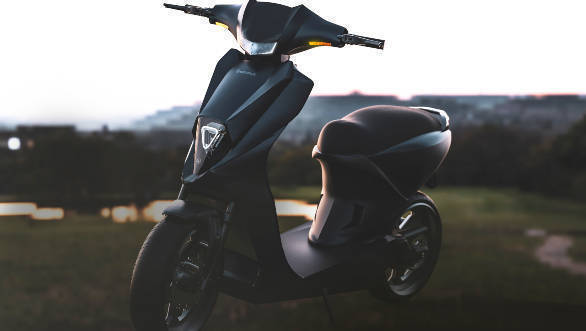 Powering the Mark 2 is a mid-mounted IP67-rated 3.5kW (continuous) BLDC electric motor producing 72Nm
Powering the Mark 2 is a mid-mounted IP67-rated 3.5kW (continuous) BLDC electric motor producing 72Nm
The Mark 2 will be priced at around Rs 1-1.10 lakh, ex- showroom, which Rajkumar believes, will not only be a competitive offering against its rivals but will also give a better, cleaner and feature-rich alternative to a Rs 90,000-95,000 ICE scooter while offering a longer riding range and substantially lower cost of ownership. Simple Energy will be offering a warranty of 3yrs/30,000km on the e-scooter and 3yrs/unlimited km warranty on the battery. The company claims to have already received over 7,000 enquiries for pre-booking in the last month.
Starts Rs 6.95 Lakhs
1497cc
Automatic
110
260
21.5 Kmpl
Starts Rs 13.99 Lakhs
-NA-
Automatic
129
245
-NA-
Starts Rs 1,00,000
-NA-
Automatic
-NA-
16.00
-NA-
Starts Rs 98,564
-NA-
Automatic
-NA-
140.00
-NA-
